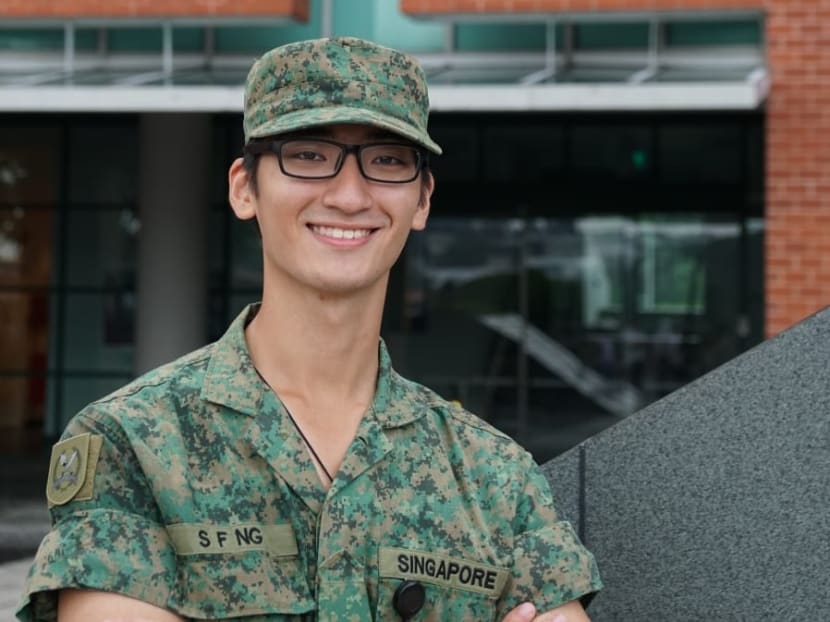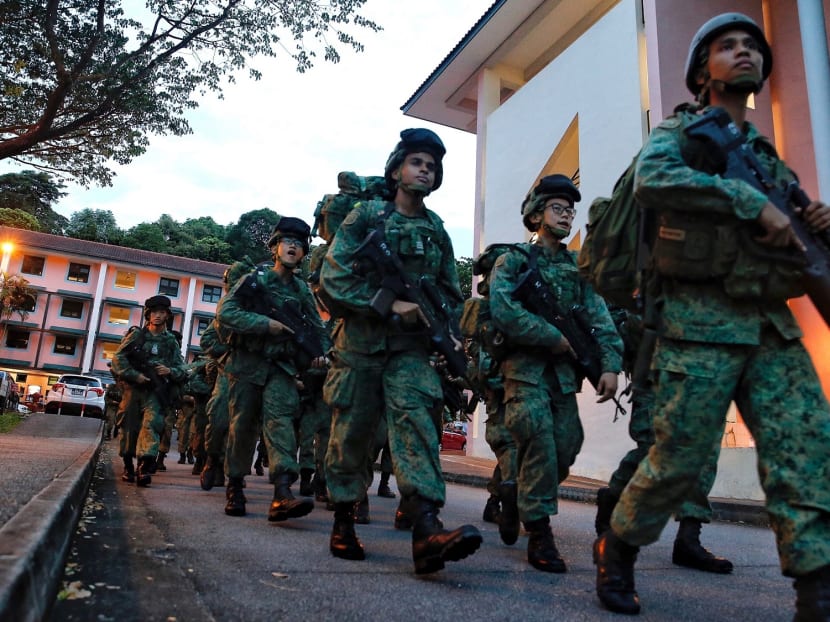Juggling NS with sports too high a hurdle for some national athletes, but others say it can be done
SINGAPORE — National foil fencer Jet Ng used to put in up to six training sessions weekly, but the 20-year-old has had to cut back since enlisting for full-time National Service (NS) in October 2017. Now in Officer Cadet School (OCS), Ng admitted that juggling NS commitments with training and competitions can be tough for any athlete.
SINGAPORE — On Friday nights, national foil fencer Jet Ng books out from the SAFTI Military Institute camp in Jurong, and his parents ferry him to the National Training Centre at the Sports Hub in Kallang to join his teammates for training.
The next morning, he is back on the training piste at Z Fencing International Academy with his coach Joseph Engert, forgoing parties and catch-up sessions with friends in order to squeeze in as much training time as he can over the weekend.
Ng used to put in up to six training sessions weekly, but the 20-year-old has had to cut back since enlisting for full-time National Service (NS) in October 2017.

Now in Officer Cadet School (OCS), Ng admitted that juggling NS commitments with training and competitions can be tough for any athlete.
While he “lost out” on his technical fencing skills, Ng said Basic Military Training (BMT) and OCS boosted his physical fitness and conditioning.
“After BMT, my stats for the Singapore Sports Institute’s physical fitness test improved… they increased even more after my service term in OCS,” said the 2017 SEA Games bronze medallist.
“My physical condition has improved and I can last longer on the fencing piste… I’m faster and sharper.”
Considered a rite of passage for all Singaporean sons, NS was thrust into the spotlight recently when Fulham footballer Ben Davis’ request for long-term deferment from NS was rejected by the Ministry of Defence (Mindef).
The issue sparked a spirited discussion among Singaporeans, and an online petition to Mindef supporting his deferment has since drawn more than 21,000 signatures. While some argued that the 17-year-old’s professional career – as well as his football abilities – would suffer if he had to put it on hold to serve NS, others felt that it was possible to juggle NS with sports.
Speaking in Parliament earlier this month, Defence Minister Ng Eng Hen said that performing NS duties and pursuing national aspirations for sports excellence do not have to be mutually exclusive. He cited examples of footballers such as Saifullah Akbar, Irfan and Ikhsan Fandi, who had completed NS and were talent-spotted for trials in professional leagues overseas.
‘A LOT OF SACRIFICES’
Like Ng, former national shuttler Derek Wong, 29, also had to juggle his duties as a police staff assistant with badminton training when he was serving NS.
Wong, who won silver and bronze at the 2014 Commonwealth Games in Glasgow, enlisted in March 2007, and completed four months of Basic Police Training before he was posted to Serangoon Neighbourhood Police Centre.
As he worked office hours, he was able to train a few times a week at the old Singapore Badminton Hall at Guillemard Road.
Admitting that “one year and 10 months of NS is brutal for an elite athlete”, Wong said he had to push himself harder in order to catch up with athletes from other countries who did not have similar obligations.
“At that time (former national player) Terry Yeo was in police training with me, so both our dads took turns to drive us from training back to camp in the night,” he said.
“Sometimes, when they were busy we had to take a MRT train or a taxi at our own expense as we had to reach camp by 11.59pm.”
He added that “a lot of sacrifices were made” by his parents, as well as sparring partners, coaches and Singapore Badminton Association staff who had to accommodate their training times. He was granted leave to compete in three to four competitions a year, a number that he said was “quite little” for badminton players.
TOO HIGH A HURDLE
While there have been success stories among Team Singapore’s male athletes, not all were able to overcome the NS hurdle.
Former national jumper Matthew Goh, 27 – who holds the national record of 7.62m in the long jump – told TODAY that he trained for eight months after enlisting for NS in April 2010 before deciding to throw in the towel.
A combat engineer, Goh had to undergo additional months of training for his role due to his vocation. That, along with the rigour of training and a lack of facilities at his camp proved to be challenging.
“For about eight months I would find pockets of free time in camp to train when others were resting,” said Goh, who works as a trader at a bank.
“There was no sand pit and we were not allowed to go onto the track. I did bounding exercises on the road. (After BMT) when I had days off, I was tired and most of my peers had stopped training. I often trained by myself and eventually it was not very productive.”
Describing it as a “very sad” experience, Goh had submitted a request for NS deferment ahead of his enlistment in order to train and qualify for the 2010 Asian and Commonwealth Games.
His national record of 7.62m from the 2009 SEA Games was then just 0.07m shy of the qualifying mark of 7.69m for the Asiad, while the Commonwealth Games qualifying standard was 7.96m.
According to the Singapore National Olympic Council’s qualifying criteria, athletes aiming to compete at both major Games have to meet the sixth fastest time or mark from the previous edition in order to make the cut.
His request was denied, and he enlisted soon after.
After reaching his Operationally-Ready Date (ORD) in 2012, he decided to call time on his career as a national athlete to focus on his university studies.
Fellow national jumper Calvin Cheng, 28, also ran into obstacles while serving NS from 2010 to 2012 as he was unable to get time off to train.
Stricken with heat exhaustion on a few occasions as he has an autoimmune condition – his body is unable to perspire – he was assigned duty as a clerk due to his non-combat fit status.
As a result of his status, his application for time off to train was turned down.
Cheng admitted that “it was my decision to stop sports”, adding that while NS was one of the factors, the lack of support and funding from the then-Singapore Athletic Association also contributed to his decision.
Pointing out that a number of his fellow athletes from the Singapore Sports School had also hung up their spikes after NS, Cheng said that things need to change if “we want to achieve sports excellence and be a sporting nation”.
“They come up with the sports school and spend millions collectively, and then having NS be a stumbling block is just not consistent,” added the legal executive.
Referring to the SAF Music & Drama Company, he suggested that a similar unit could be set up for national sportsmen so that they could dedicate their time in NS to training in their respective sports.
MORE FLEXIBILITY
Some of the former athletes similarly felt that Mindef could exercise more flexibility for national athletes.
“Things can be done and policies can be changed,” said Goh, who noted that “there are some sports where you can lay off for a year and come back okay, but you can’t for some others like athletics”.
“Maybe there is a need to be more flexible,” he said.
Agreeing, Cheng added: “It’s really hit or miss at the moment as it depends on your unit, where you are posted, and your commanding officer.”
Ng, however, believes that it is still possible to serve NS and achieve sporting success. “I definitely believe it is possible… How can you even say it’s not possible if you don’t try?”
Sign up for TODAY's WhatsApp service. Click here:







